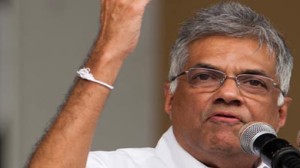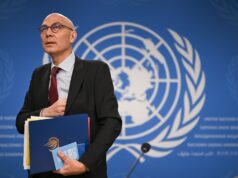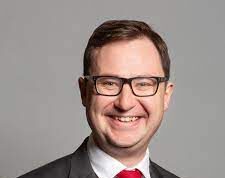 Asserting that there was no legal basis for an international investigation within Sri Lanka, Prime Minister Ranil Wickremesinghe said that there should be a domestic inquiry into the alleged violations of human rights in Sri Lanka.
Asserting that there was no legal basis for an international investigation within Sri Lanka, Prime Minister Ranil Wickremesinghe said that there should be a domestic inquiry into the alleged violations of human rights in Sri Lanka.
In an interview with India’s The Hindu, the day after he assumed office, Mr. Wickremesinghe said that it should be a domestic inquiry as Sri Lanka wasn’t a signatory to the Statute of Rome.
“We have agreed it is domestic for the simple reason that we did not sign the Statute of Rome. The commitment that was given by the Rajapaksa administration to the U.N. Human Rights Council (UNHRC) in 2009 could be interpreted in many ways. At one stage they were moving towards international investigation. But we always said, the UNP, that there was no legal basis for international investigation within Sri Lanka; it had to be domestic,” he said.
He also said, “The reason some of the people have been calling for international investigation is the loss of confidence in the judiciary. We’ve had this problem before, in the North and in the South. We would like to put forward a domestic mechanism which would be within the four corners of our Constitution but would also be acceptable to all the communities in Sri Lanka plus the international community.”
Prime Minister Wickremesinghe is also confident and hopeful that the political situation in Sri Lanka following the August 17 general elections, although complex, is favourable for forging an enduring political solution to the Tamil question.
Noting that the two main national parties (his United National Party and the Sri Lanka Freedom Party), and the Tamil National Alliance were “the three key players” in formulating the proposals for an enduring solution, he said he had “tried to keep the UNP position flexible so that we can bridge the differences.” Responding to a question on former President Chandrika Kumaratunga, he confirmed that she would have a significant role to play in this regard.
A day after he assumed office, Prime Minister Wickremesinghe spoke to The Hindu at Temple Trees on a wide range of issues, including the project of working out a new Constitution for Sri Lanka, finding an enduring political solution to the Tamil question, and livelihood development, and human rights issues.
Asked about time lost after the war with the LTTE ended in 2009 and the prospects of moving towards an enduring political solution now, Mr. Wickremesinghe responded: “There have been a lot of administrative barriers, which have to be removed. Secondly, there has been a request by some of the Provincial Councils that as far as the powers exercised jointly, by both the Centre and the Provinces (concurrent powers) are concerned, some could be transferred to the Provinces. Those are the main issues and we have to work this out.”
To a question about how the two sides could avoid getting caught in a terminological dispute over a ‘unitary’ versus ‘federal’ solution, he said: “Substance is what we have to look at. The formula which was accepted by India also. Let’s see how we work it out within the 13th Amendment. Maximise it. Let’s build on this. That’s what we are talking about now.”
The Sri Lankan Prime Minister also expressed the hope that a political consensus could be reached within months on a new Constitution for Sri Lanka, especially because the issues that needed to be resolved were fairly narrow.
source: www.dailymirror.lk





